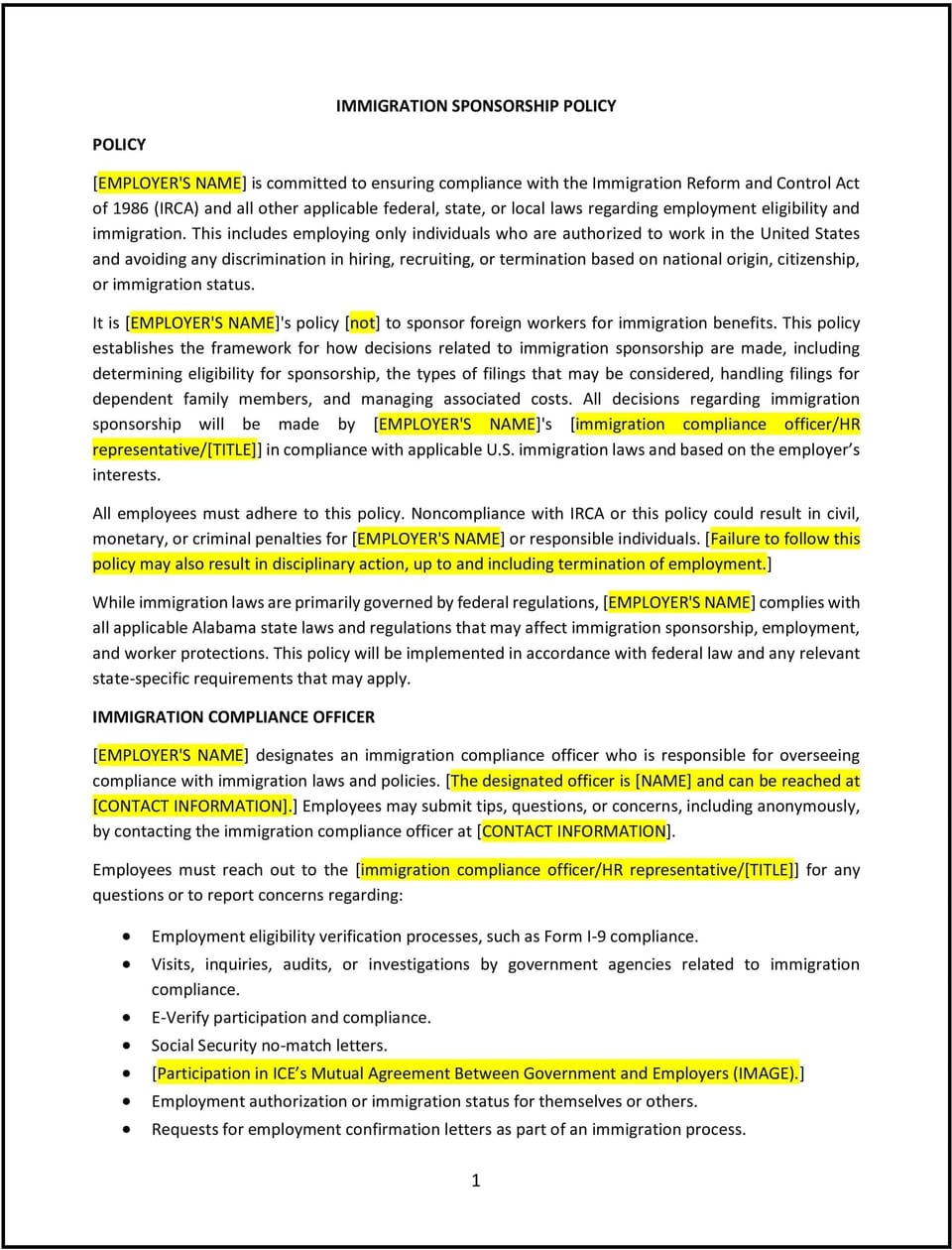Immigration sponsorship policy (Alabama): Free template

Immigration sponsorship policy (Alabama)
An immigration sponsorship policy outlines the guidelines for providing sponsorship to foreign nationals who require work authorization to be employed in the United States. For SMBs in Alabama, this policy ensures a consistent approach to supporting employees who need visas, such as H-1B, TN, or green card sponsorships, while complying with federal immigration laws.
By detailing eligibility criteria, processes, and responsibilities, this policy provides clarity for both employers and employees, fostering a fair and transparent sponsorship process.
How to use this immigration sponsorship policy (Alabama)
- Define eligibility: Specify the criteria employees must meet to qualify for sponsorship, such as specific roles, skills, or tenure requirements.
- Outline sponsorship types: Detail the types of visas or statuses the company supports, such as temporary work visas, permanent residency applications, or student visa transitions.
- Explain the application process: Provide step-by-step instructions for initiating sponsorship, including required documents, timelines, and employer-employee responsibilities.
- Address cost-sharing: Clarify which costs will be covered by the company (e.g., filing fees, legal fees) and any employee responsibilities for associated expenses.
- Emphasize compliance: Include measures to ensure adherence to U.S. immigration laws, such as proper documentation and timely filing of applications.
Benefits of using an immigration sponsorship policy (Alabama)
A well-structured immigration sponsorship policy provides significant benefits for both the business and its employees. Here’s how it helps:
- Attracts top talent: Enables your business to recruit skilled workers from a global talent pool, filling critical roles.
- Enhances transparency: Provides clear guidelines for employees, reducing misunderstandings about sponsorship processes and eligibility.
- Promotes consistency: Ensures all sponsorship decisions follow a standardized approach, minimizing perceived favoritism or bias.
- Supports compliance: Helps your business adhere to federal and state regulations, reducing legal risks and penalties.
- Boosts employee morale: Demonstrates your company’s commitment to supporting diverse talent, fostering loyalty and trust.
Tips for implementing an immigration sponsorship policy (Alabama)
- Partner with legal experts: Collaborate with immigration attorneys or consultants to ensure compliance with the latest federal and state laws.
- Communicate clearly: Provide employees with a clear understanding of the process, timelines, and expectations from both parties.
- Monitor visa timelines: Keep track of visa expiration dates and filing deadlines to avoid disruptions in employment or legal status.
- Offer support resources: Provide access to resources like relocation assistance, cultural integration programs, or guidance on settling in Alabama.
- Review regularly: Periodically update the policy to reflect changes in immigration laws, company priorities, or workforce needs.
Q: What types of visas are supported under this policy?
A: The policy typically covers work visas such as H-1B, TN, L-1, or E-2, as well as green card sponsorship for eligible employees.
Q: Who determines eligibility for sponsorship?
A: Eligibility is typically determined by HR and management, based on the employee’s role, skills, and the company’s business needs.
Q: What costs are covered by the company?
A: The company generally covers required filing fees and legal costs, but employees may be responsible for optional expenses like premium processing fees.
Q: How long does the sponsorship process take?
A: Timelines vary depending on the visa type and case complexity, ranging from a few months for temporary work visas to several years for green cards.
Q: Can employees on sponsored visas transfer to other roles within the company?
A: Role changes may require updates to the sponsorship application or a new petition, depending on visa requirements and legal considerations.
Q: What happens if an employee leaves before the sponsorship process is completed?
A: The company’s policy should specify how costs and responsibilities are handled if the employee leaves, typically requiring advance notice or cost reimbursement agreements.
This article contains general legal information and does not contain legal advice. Cobrief is not a law firm or a substitute for an attorney or law firm. The law is complex and changes often. For legal advice, please ask a lawyer.


